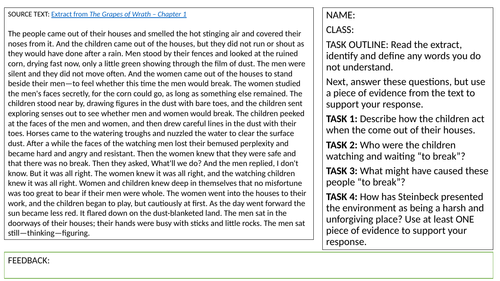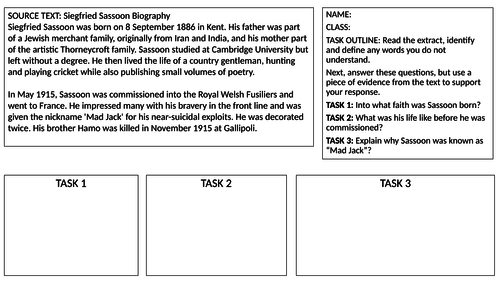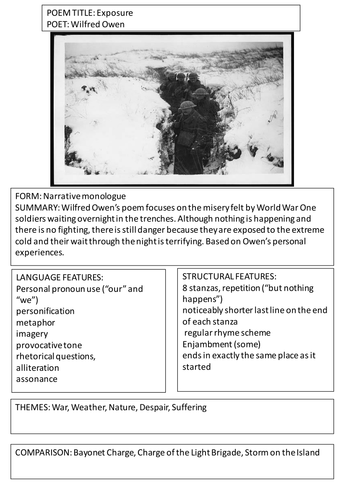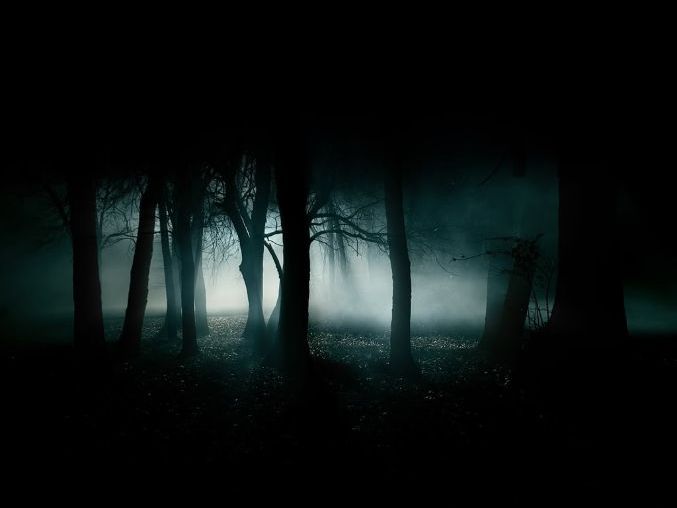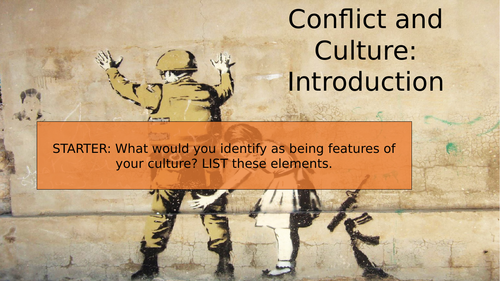
236Uploads
545k+Views
1358k+Downloads
All resources

AQA English Literature Power and Conflict Poetry: Random Comparative Question Generator
Does exactly what it says. This spreadsheet will create one random comparative question for and will generate a new one every time you double-click a cell and press enter. A word of caution in that you cannot retrieve the old question. But, this is very useful for revision and or cover lessons.
I’ve left room for you to add in your own question stems and you can manipulate the poetry lists too. I’ve left some instructions on the relevant tab.
Hope you find this useful.

AQA English Literature Poetry Knowledge Tracker Spreadsheet
A useful little tool. It allows you to RAGB(red, amber, green, blue) your students understanding/annotations of the 15 Power and Conflict poems in the AQA anthology. Also, it provides you with a poem by poem breakdown of your classes understanding/quality of annotations so you can see where the gaps are all the clearer.
The spreadsheet is set up for a class of up to 40, but the coding can easily be altered to allow for a whole year group.

KS3: SPaG Understanding a Text Lessons (Focusing on John Steinbeck)
Designed to be taught in support of a Year 9 class doing a GCSE-style task on Of Mice and Men. These powerpoints make good activities as part of a lesson, or they can be printed off as individual worksheets. The worksheet element contains a RAG rating system and some generic targets, suited for peer or self assessment.

KS3: SPaG Understanding a Text Lessons (Focusing on WW1 poets and their background)
This uses a format I’ve used elsewhere. The lessons are designed to support the teaching of conflict poetry from WW1. The goal is that the students sharpen their reading skills and get a boost in their English lessons where the poet is the subject of focus.

AQA A-Level English Language and Literature: The Tollund Man
A lesson I put together to assist with the teaching of The Tollund Man. Pay attention to the notes element of the power point. I source a lot of information from a lot of different places here.
Also, the essay questions at the end tee up nicely into a lesson focusing on comparison.

KS3: SPaG Understanding a Text Lessons (Using Michael Grant's "Gone" series as a stimulus)
SPAG lessons can get a little flat at times. These are the worksheets I’ve designed to use with my own SPAG group. It is designed to be taught in tandem with a Dystopian Fiction SoW that ends with a reading assessment. Specifically, these lessons focus on an extract taken from Michael Grant’s “Gone” - all extracts taken from the first chapter. The aim is to develop an increased understanding of each text through the asking of more and more complex questions. The tasks can be sat as part of a lesson (I reckon they’ll take most groups between 10-30 minutes depending on the groups setting), or make ideal homework and/or extension tasks.
At the moment, the resources are set up to be taught to lower set year 7 students. But, it won’t be too hard to change the tasks to more suitable ones for any set.
UPDATE: I’ve included some versions that are more suited to be printed out. They have some basic RAG feedback grids on the back with some generic targets.

AQA A-Level English Language and Literature - Introduction to Poetry (Heaney)
My introduction unit for A-Level Language and Literature. It assumes that the academic voices of the students needs sharpening somewhat. I source a lot of stuff from various corners of the net and use it in the power points - pay particular attention to the notes element of the power points by the way. I also include a “model essay” the purpose of which is to get the students to move away from their formulaic essay structures that they have used in their GCSEs.
Think of this as a starting point that may need a little shaping to suit the needs of your class.

Spell Quest - making spelling fun
A summer spent playing word games with my kids lead me to this idea.
The idea is that the students are supplied with a grid of letters. They use these letters to build words which cause damage to a cartoon monster. The bigger the word, the more damage done to the monster.
I’ve made it more and more difficult as the monsters develop - you have to use certain letter types for example.
I plan to give each child one grid per week to complete and have their peers mark it.
So you are completely aware, I have left all of the grids blank apart from on a few. You will need to fill these in yourself. Also, I have left the challenge component blank too. This will allow you to create challenges that reflect the specific types of spellings you are looking at - double damage awarded for homophones for example.
There’s massive scope for differentiation in here too. I’ve included a whole class version of the spelling levels, as well as a photocopy friendly version too.
I have long believed that making school a little more like computer games can be helpful - this is my first attempt at exploring Gamer Theory as I have dubbed it.
Watch this space for more. Have to figure out how to do something similar with the other components of SPAG and Reading now…
ADDITION: I’ve included some completed versions of the pack to give you an idea of what they could look like. Pay attention to the NOTES section of the power points too. These grids have been designed to be used in tandem with the Escape From Kraznir scheme of work.
ADDITION: I’ve also added a new powerpoint that works as a whole class exercise. You don’t need the sheets, just paper and the will to go on…

KS3 and KS4: Exploring Dystopian Fiction Creative Writing Unit
I am very pleased with this. We have a problem with retention of English students at A-Level at our place - the English GCSE is just VERY boring. So, part of the plan to address this is to make the sorts of lessons that kids will remember in Key Stage 3; make them fall in love with the subject so to speak.
This is my best efforts at doing just that.
The first lesson covers the basics of Dystopian Fiction - you will need some Dystopian Fiction extracts for this. I picked from the following texts:
The Hunger Games
Maze Runner
Do Androids Dream of Electric Sheep
The Handmaid’s Tale
Ready Player One
1984
Battle Royale
I cannot sell the resource if I put the extracts up on here, but finding your own examples shouldn’t be too tough. But, I did find a free version of the Hunger Games Chapter 1 at the following link:
http://www.scholastic.com/thehungergames/media/hungergames-chapter1.pdf
The second lesson (lessons really) focuses purely on the first chapter of The Hunger Games. Here, we analyse and explore the text before giving the students the chance to write creatively.
The last lessons in the largest power point are a lot of fun. Essentially, the lessons require the students to write a series of mission logs as they flee from a devastated earth, only to be forced to return. There are two versions: one with no music and one with LOADS of atmospheric music attached.
Both powerpoints have a load of set-up animations which run automatically. I advise you go through the powerpoint several times before putting it in front of the kids. And when you do, make sure you have the volume up.
This is one of those lessons they won’t forget in a hurry, I promise.
ADDITION: So I tried this with my Year 10s. They loved it too…
ANOTHER ADDITION: I’ve chucked a debate boxing lesson on the end - it assumes a lot of knowledge of The Hunger Games (shouldn’t be a problem with the films).

AQA Power and Conflict Poetry Revision Cards
A series of revision cards designed for students to use independently to aid with the revision process. I will add to these as I go.

AQA English Language Paper 1 Section A Talking Mock Exam
A talking mock lesson (two hours long) with strategies on the slides for the students to refer to and time limits identified. The idea is that prior to each question, you are to remind students of how to answer the question. The expectation is that the class will have attempted a Paper 1 Section A beforehand - this is the lesson where they try and beat their previous scores. A quick word of warning: the exam paper is available elsewhere in my shop.

AQA A-Level English Language and Literature: Othello (Revision)
A stand alone lesson that assumes all participants have read and understood the text. I used it as a platform to show students what they needed to be revising. There is some focus on themes and a focus on an extract - both areas of which I use as a stimulus for class lead discussion. I finish with an exam based question - the focus is upon the characters that are manipulated, not the manipulator (just to keep them on their toes). Hope you find this useful.

AQA English Language Paper 1 focused writing tasks
A couple of lessons that focus on improving creative writing skills. I allude to tasks that have already been completed by the students - you can easily edit these to reflect your own tasks. Particularly pleased with the descriptive writing task as it got a bunch of lads who don’t “do” creative writing to talk about their feelings.

AQA English Language Paper 1 Resources - based upon 100% Perfect Girl
A few things first: the mock exam can be found elsewhere on in my resources and I base the lessons off a similar series of lessons focused on Anil. The difference here is that these lessons are very much targeting higher ability students - all of the success criteria draws from the top end of the mark criteria.
I found this series of lessons to be really useful as a way of establishing the skills required to answer each of the Section A questions. The lessons focus less on exam strategy and more on understanding what is required in relation to each question. The kids found it useful.
Bundle

Jekyll and Hyde Bundle
A Jekyll and Hyde scheme of work (designed to be taught over a whole term) and a revision unit (desgined to betaught over a few weeks). Also, I include a spreadsheet that allows you to track the scores of your students.

KS3: Conflict and Culture Poetry - a stimulus for Creative Writing
I've had a lot of fun teaching these lessons. Essentially, the idea is you spend a lesson exploring a poem and then a creative angle has been drawn from the text to inform the creative writing lesson that follows. Each of the creative writing lessons assumes a two hour window. A simple scheme, but I've found it to be rather effective.
Bundle

Year 7 English Curriculum
A series of resources that make up a curriculum that can be taught to year 7.
Bundle

AQA English Literature Paper 1 Bundle
Jekyll & Hyde, A Christmas Carol and Romeo & Juliet resources PLUS a spreadsheet to track them all.



